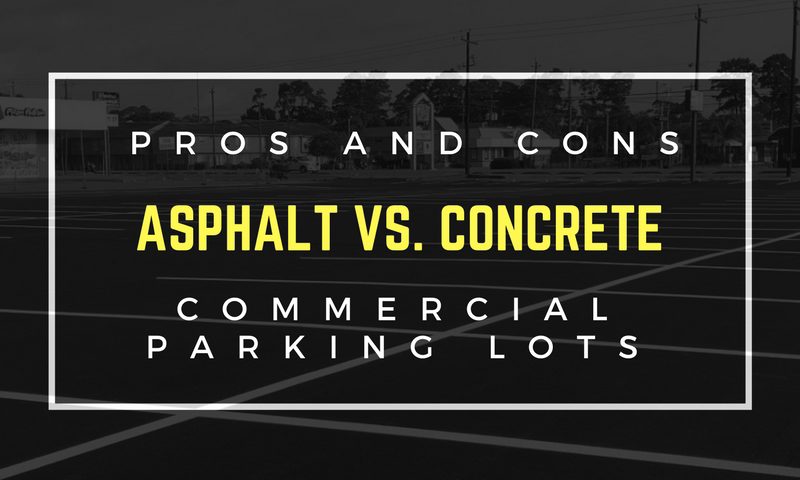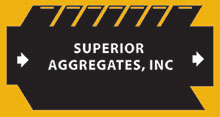
Pros and Cons: Asphalt vs. Concrete Commercial Parking Lots
Commercial parking lots must be designed to withstand large volumes of traffic, seasonal weather conditions, and heavy vehicle loads. These factors must also be weighed against the anticipated lifespan of the commercial parking lot, the disruption that maintenance will cause, and the amount of money that can be spent building and maintaining the area. While, asphalt companies and concrete companies are both quick to point the benefits of their products, it is important to also consider the possible cons.
The Pros of Concrete Installation
There are several benefits to building a commercial parking lot with concrete. These pros include:
- Better Suited For Hot Weather. — Concrete commercial parking lots tend to be better suited for hot weather. Unlike asphalt parking lots that can soften and become oily in extreme heat conditions, concrete lots often feature a lighter color that results in cooler temperatures during the summer. Its surface is also less likely to expand or change during the hot summer months.
- Less Maintenance. — One of the biggest benefits of concrete parking lots is that they don’t require regular maintenance.
- Longer Life Span. — Concrete commercial parking lots tend to last longer than asphalt. In fact, in the right conditions a concrete lot can last for more than 40 years.
- Additional Customization Options. — Concrete parking lots are available in a wide variety of colors, textures, and design options.
The Cons of Concrete Installation
One of the biggest things to consider when choosing between a concrete and asphalt parking lot is the climate. In fact, many of the cons of concrete installation are centered around its reaction to below freezing temperatures.
- Subject To Frost Heaves. — Concrete parking lots are unfortunately subject to frost heaves. Frost heaves not only create uneven surfaces, but they often require immediate maintenance so that the area can remain safe for daily use.
- Susceptible To Salt Damage. — The salt used to melt ice and snow can cause long-lasting damage to concrete.
- More Expensive To Install. — Concrete might be easier to maintain than asphalt, however it is more expensive to install.
- Long Curing Time. — Concrete can take up to seven days before it is properly cured and ready to be used.
- Water Runoff Management. — Unlike asphalt, concrete is not permeable, which means that businesses will need to implement a water runoff management plan, especially in areas that are susceptible to extended periods of heavy rain.
The Pros of Asphalt Installation
Asphalt installation offers many potential benefits, including:
- Easy Installation. — An asphalt commercial parking lot can be laid, cured, and ready to use in as little as two days.
- Not Affected By Cold Temperatures. — Unlike concrete, asphalt is typically not affected by below freezing temperatures. Its surface doesn’t deteriorate from extended salt use during winter months.
- Materials Are Readily Available. — Asphalt is a material that is readily available, which means that commercial parking lot projects can often be completed more quickly.
- Less Expensive To Install. — Asphalt parking lots are significantly less expensive to install.
- Easier To Repair. — While asphalt does require more maintenance than concrete, these repairs are often inexpensive and easy to complete.
The Cons of Asphalt Installation
Asphalt parking lots do have a few potential drawbacks, including:
- More Preventative Maintenance. — Unlike concrete that requires minimal maintenance, asphalt does require quite a bit of preventative maintenance. The additional level of maintenance can make asphalt more expensive than concrete in the long run.
- Surface Damage From Gasoline. — Gasoline stains and leakage can cause damage to the surface of the asphalt commercial parking lot.
- Shorter Lifespan. — While asphalt can last for 15 – 20 years, concrete is known for lasting between 30 and 40 years.
- Negatively Affected By Heat. — Asphalt parking lots can be affected by extreme heat. Higher temperatures can cause the surface to shrink, expand, and produce an oil sheen.
- More Permeable Surface. — When compared to concrete, asphalt has a much softer and more permeable surface that is more susceptible to excess damage from snowplows during the winter months.
Concrete vs. Asphalt: The Choice Is Yours
Both asphalt and concrete installations offer a wide variety of benefits. Selecting the right choice for your business is made easier when you work with a trusted concrete and asphalt company, who will help you to weigh the pros and cons. Whether you want to save on the initial upfront costs of asphalt or prefer the design options associated with concrete, it is safe to say that either option will create a good commercial parking lot.
Commercial parking lots must be designed to withstand large volumes of traffic, seasonal weather conditions, and heavy vehicle loads. These factors must also be weighed against the anticipated lifespan of the commercial parking lot, the disruption that maintenance will cause, and the amount of money that can be spent building and maintaining the area. While, asphalt companies and concrete companies are both quick to point the benefits of their products, it is important to also consider the possible cons.
The Pros of Concrete Installation
There are several benefits to building a commercial parking lot with concrete. These pros include:
- Better Suited For Hot Weather. — Concrete commercial parking lots tend to be better suited for hot weather. Unlike asphalt parking lots that can soften and become oily in extreme heat conditions, concrete lots often feature a lighter color that results in cooler temperatures during the summer. Its surface is also less likely to expand or change during the hot summer months.
- Less Maintenance. — One of the biggest benefits of concrete parking lots is that they don’t require regular maintenance.
- Longer Life Span. — Concrete commercial parking lots tend to last longer than asphalt. In fact, in the right conditions a concrete lot can last for more than 40 years.
- Additional Customization Options. — Concrete parking lots are available in a wide variety of colors, textures, and design options.
The Cons of Concrete Installation
One of the biggest things to consider when choosing between a concrete and asphalt parking lot is the climate. In fact, many of the cons of concrete installation are centered around its reaction to below freezing temperatures.
- Subject To Frost Heaves. — Concrete parking lots are unfortunately subject to frost heaves. Frost heaves not only create uneven surfaces, but they often require immediate maintenance so that the area can remain safe for daily use.
- Susceptible To Salt Damage. — The salt used to melt ice and snow can cause long-lasting damage to concrete.
- More Expensive To Install. — Concrete might be easier to maintain than asphalt, however it is more expensive to install.
- Long Curing Time. — Concrete can take up to seven days before it is properly cured and ready to be used.
- Water Runoff Management. — Unlike asphalt, concrete is not permeable, which means that businesses will need to implement a water runoff management plan, especially in areas that are susceptible to extended periods of heavy rain.
The Pros of Asphalt Installation
Asphalt installation offers many potential benefits, including:
- Easy Installation. — An asphalt commercial parking lot can be laid, cured, and ready to use in as little as two days.
- Not Affected By Cold Temperatures. — Unlike concrete, asphalt is typically not affected by below freezing temperatures. Its surface doesn’t deteriorate from extended salt use during winter months.
- Materials Are Readily Available. — Asphalt is a material that is readily available, which means that commercial parking lot projects can often be completed more quickly.
- Less Expensive To Install. — Asphalt parking lots are significantly less expensive to install.
- Easier To Repair. — While asphalt does require more maintenance than concrete, these repairs are often inexpensive and easy to complete.
The Cons of Asphalt Installation
Asphalt parking lots do have a few potential drawbacks, including:
- More Preventative Maintenance. — Unlike concrete that requires minimal maintenance, asphalt does require quite a bit of preventative maintenance. The additional level of maintenance can make asphalt more expensive than concrete in the long run.
- Surface Damage From Gasoline. — Gasoline stains and leakage can cause damage to the surface of the asphalt commercial parking lot.
- Shorter Lifespan. — While asphalt can last for 15 – 20 years, concrete is known for lasting between 30 and 40 years.
- Negatively Affected By Heat. — Asphalt parking lots can be affected by extreme heat. Higher temperatures can cause the surface to shrink, expand, and produce an oil sheen.
- More Permeable Surface. — When compared to concrete, asphalt has a much softer and more permeable surface that is more susceptible to excess damage from snowplows during the winter months.
Concrete vs. Asphalt: The Choice Is Yours
Both asphalt and concrete installations offer a wide variety of benefits. Selecting the right choice for your business is made easier when you work with a trusted concrete and asphalt company, who will help you to weigh the pros and cons. Whether you want to save on the initial upfront costs of asphalt or prefer the design options associated with concrete, it is safe to say that either option will create a good commercial parking lot.
